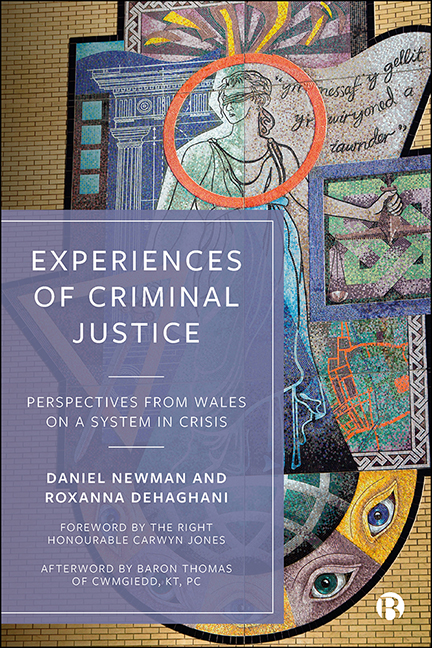Book contents
- Frontmatter
- Contents
- List of Figures and Tables
- Foreword
- Acknowledgements
- 1 Why Wales?
- 2 A System in Crisis
- 3 The People and Their Experiences
- 4 Criminal Justice in Its Place
- 5 Pressures of Practice
- 6 Criminal Justice Relationships
- 7 Navigating the Criminal Justice System
- 8 Doing Criminal Justice Differently
- Afterword
- References
- Index
Afterword
Published online by Cambridge University Press: 15 September 2022
- Frontmatter
- Contents
- List of Figures and Tables
- Foreword
- Acknowledgements
- 1 Why Wales?
- 2 A System in Crisis
- 3 The People and Their Experiences
- 4 Criminal Justice in Its Place
- 5 Pressures of Practice
- 6 Criminal Justice Relationships
- 7 Navigating the Criminal Justice System
- 8 Doing Criminal Justice Differently
- Afterword
- References
- Index
Summary
Criminal Justice has over the centuries reflected the way in which a society has tried to address infringements of the law which cause harm to others or to society. Over a long period of time it was characterized by the degree of harshness in the way it adjudged those thought to have committed a crime and the often cruel way in which it punished them, though Wales was one of the exceptions to this in the age of its Kings.
Today we generally approach the issues with a wider compass, looking at how we address the causes of crime, the way we seek to prevent it and the need for a just and fair procedure to determine guilt or innocence. For the most part, we accept there are no easy answers to the determination of punishment for those found guilty or the way in which that punishment is administered.
The attitude of society to the approach that should be taken to these issues and the money that will be provided to address them depend upon a balanced and clear understanding of the way in which criminal justice is administered. The great merit of this study, as the reader will have learnt, is that it provides such a balanced and clear understanding in relation to Wales based on careful objective research.
As has been made clear, research in relation to Wales is greatly needed. The attitude of the government in London over a long period of time, as so well summarized in the Foreword, has meant that evidence, research and statistical information that consider the distinctive position in Wales are scant; they been submerged by the far greater volume of information about England. It is the real achievement of the authors that a considerable amount of evidence has been obtained and in-depth research conducted to set out the problems as they exist in Wales.
The study makes clear why these need to be addressed by acknowledging that Wales is a different nation to England in so many respects. Some of the issues are of long standing – the most obvious being the fact that Wales is a bilingual nation, its smaller communities and its geography.
- Type
- Chapter
- Information
- Experiences of Criminal JusticePerspectives from Wales on a System in Crisis, pp. 223 - 224Publisher: Bristol University PressPrint publication year: 2022



